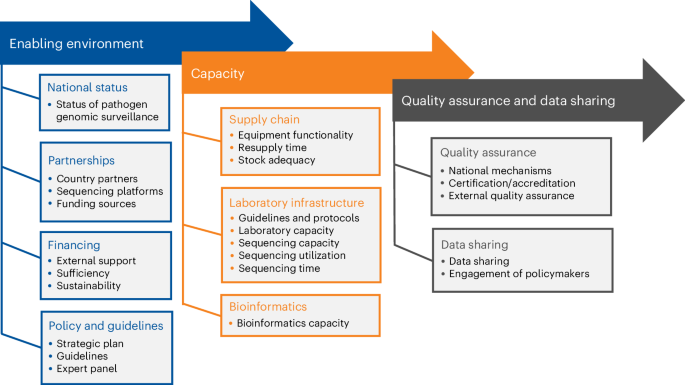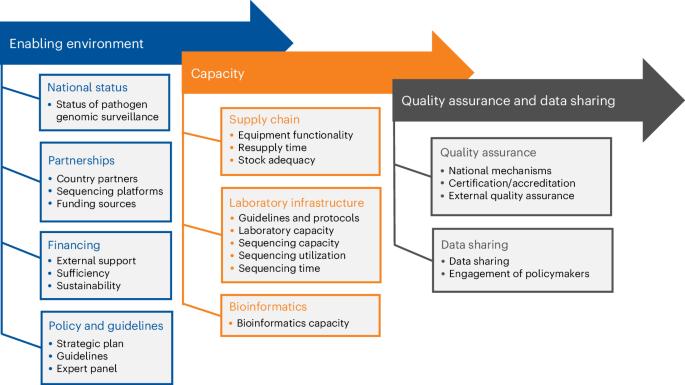Pathogen genomic surveillance status among lower resource settings in Asia
IF 20.5
1区 生物学
Q1 MICROBIOLOGY
引用次数: 0
Abstract
Asia remains vulnerable to new and emerging infectious diseases. Understanding how to improve next generation sequencing (NGS) use in pathogen surveillance is an urgent priority for regional health security. Here we developed a pathogen genomic surveillance assessment framework to assess capacity in low-resource settings in South and Southeast Asia. Data collected between June 2022 and March 2023 from 42 institutions in 13 countries showed pathogen genomics capacity exists, but use is limited and under-resourced. All countries had NGS capacity and seven countries had strategic plans integrating pathogen genomics into wider surveillance efforts. Several pathogens were prioritized for human surveillance, but NGS application to environmental and human–animal interface surveillance was limited. Barriers to NGS implementation include reliance on external funding, supply chain challenges, trained personnel shortages and limited quality assurance mechanisms. Coordinated efforts are required to support national planning, address capacity gaps, enhance quality assurance and facilitate data sharing for decision making. Surveying next generation sequencing capabilities in 13 Asian countries identifies challenges to be met for improved implementation, pathogen surveillance and integration into public health decision-making.


亚洲资源较少地区的病原体基因组监测状况
亚洲仍然容易受到新出现的传染病的影响。了解如何改进下一代测序 (NGS) 在病原体监测中的应用是区域健康安全的当务之急。在此,我们开发了病原体基因组监测评估框架,以评估南亚和东南亚低资源环境下的能力。2022 年 6 月至 2023 年 3 月期间从 13 个国家的 42 个机构收集的数据显示,病原体基因组学能力是存在的,但使用有限且资源不足。所有国家都具备 NGS 能力,7 个国家制定了将病原体基因组学纳入更广泛监测工作的战略计划。有几种病原体被列为人类监控的优先对象,但 NGS 在环境和人与动物界面监控中的应用有限。实施 NGS 的障碍包括依赖外部资金、供应链挑战、训练有素的人员短缺以及质量保证机制有限。需要协调努力,支持国家规划,解决能力差距,加强质量保证,促进决策数据共享。
本文章由计算机程序翻译,如有差异,请以英文原文为准。
求助全文
约1分钟内获得全文
求助全文
来源期刊

Nature Microbiology
Immunology and Microbiology-Microbiology
CiteScore
44.40
自引率
1.10%
发文量
226
期刊介绍:
Nature Microbiology aims to cover a comprehensive range of topics related to microorganisms. This includes:
Evolution: The journal is interested in exploring the evolutionary aspects of microorganisms. This may include research on their genetic diversity, adaptation, and speciation over time.
Physiology and cell biology: Nature Microbiology seeks to understand the functions and characteristics of microorganisms at the cellular and physiological levels. This may involve studying their metabolism, growth patterns, and cellular processes.
Interactions: The journal focuses on the interactions microorganisms have with each other, as well as their interactions with hosts or the environment. This encompasses investigations into microbial communities, symbiotic relationships, and microbial responses to different environments.
Societal significance: Nature Microbiology recognizes the societal impact of microorganisms and welcomes studies that explore their practical applications. This may include research on microbial diseases, biotechnology, or environmental remediation.
In summary, Nature Microbiology is interested in research related to the evolution, physiology and cell biology of microorganisms, their interactions, and their societal relevance.
 求助内容:
求助内容: 应助结果提醒方式:
应助结果提醒方式:


